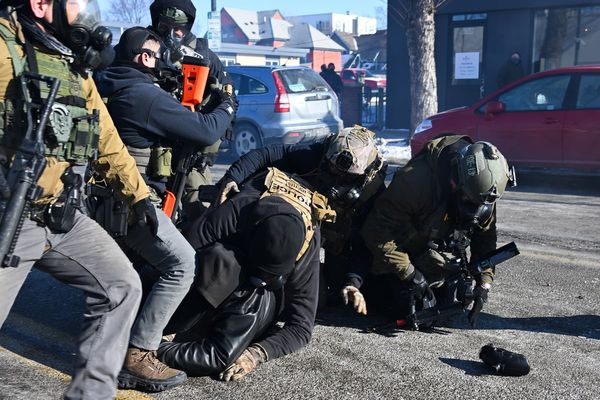New figures have revealed 20 children were strip-searched by Greater Manchester Police over a four-year period. It represents just one per cent of the total number of searches carried out under police stop and search powers between 2018 and mid-2022.
The force revealed 19 of the searches were on boys, with one on a girl, and in 13 of the 20 cases, illegal items were found. Seven of the searches resulted in an arrest.
The figures have been published by the office of the Children's Commissioner for England (CCo). In Cheshire, the figure stands at 10, with 56 children strip-searched by police in neighbouring Lancashire over the same period. GMP stressed officers 'undertake rigorous and regular training', and said it would review the report carefully.
The commissioner ordered the report after the Child Q scandal which came to light last March. The 15-year-old black schoolgirl was strip-searched by police while on her period after being wrongly suspected of carrying cannabis at school. Scotland Yard later apologised and said the strip-search at the girl's school in 2020 without another adult present 'should never have happened'.
The report looking at the national picture reveals children as young as eight have been strip-searched and black children were up to six times more likely to be strip-searched by police.
It also revealed more than half of the almost-3,000 strip-searches in recent years have taken place without an appropriate adult present, a report has shown. Locations for searches across England and Wales included police vehicles and schools with a small number even taking place in takeaways and amusement parks, the research by the Children’s Commissioner revealed.
Dame Rachel de Souza said the findings demonstrated 'evidence of deeply concerning practice' with 'widespread non-compliance' with statutory safeguards, and added that children are 'being failed by those whose job it is to protect them'.
After the Child Q scandal, Dame Rachel requested figures for strip-searches by the Metropolitan Police force which, when reported last August, showed more than 600 children underwent 'intrusive and traumatising' searches over a two-year period, with black boys disproportionately targeted.

The latest report, published on Monday and showing data for forces across England and Wales, revealed a total of 2,847 strip-searches took place between 2018 and mid-2022 of children aged between eight and 17. The vast majority of children strip-searched were boys (95 per cent) while 5 per cent of such searches were carried out on girls.
About 38 per cent of children strip-searched were black and the report found black children were up to six times more likely to be strip-searched when compared with national population figures, while white children were around half as likely to be searched.
The report described this as a 'pronounced and deeply concerning ethnic disproportionality' and Dame Rachel branded it 'utterly unacceptable'. The commissioner said she has “serious concerns about the poor quality of record-keeping, which makes transparency and scrutiny very difficult, and means that the numbers in this report may only be a minimum”.
One per cent of strip-searches were conducted “within public view”, the report said, although the location was not recorded in 45 per cent of cases. More than half (52 per cent) of strip-searches were conducted without an appropriate adult confirmed to be present.
The presence of an appropriate adult is required by law, except in cases of “urgency”, and is usually a parent or guardian but can also be a social worker, carer or volunteer. Among her recommendations Dame Rachel is calling for “urgency” to be removed as an exception and said constant supervision should be recommended.

Six per cent of strip-searches were conducted with at least one officer of a different gender than the child being searched present, the report added. Dame Rachel said while she accepted that strip-searching children can be necessary in limited situations, it is an “intrusive and potentially traumatic power” which must be subject to “robust safeguards”.
She said: “The additional complexity of conducting these searches during a stop and search should mean that there is a higher degree of scrutiny than if conducted in custody, not less.”
Dame Rachel said attention on the issue had not come about due to a police whistleblower or a damning inspection report, but “the bravery of a girl to speak up about a traumatic thing that happened to her”, referring to the case of Child Q.
The commissioner warned that officers are too often “forgetting that children are children” as she called for a strengthening of the guidelines around strip-searches, more oversight and inspection to ensure compliance, and reform of a culture “that has allowed this to go unchallenged”.
Among her 17 recommendations, Dame Rachel called on the the Home Office to carry out a comprehensive review of the legislative and policy framework for child strip-searches and make specific changes to the Police and Criminal Evidence (Pace) Codes. Among these, and regarding the requirement for an appropriate adult to be present for strip-searches of children in custody and under stop and search powers, she said it must only be “the most exceptional situations where there is serious risk to the child’s life or welfare” where this is not the case.
She said schools should be excluded as an appropriate location for a strip-search and that they should only be conducted at a nearby police station, medical premises or home address. Dame Rachel said the Home Office should require forces to report annually on the strip-searching of children, including recording ethnicity, whether an appropriate adult was present, the specific location and whether a safeguarding referral was made.
She said the National Police Chiefs’ Council should also publish an action plan on reforming stop and search practices, including strip-searches of children. Dame Rachel said: “I find it completely unacceptable that police forces in England and Wales are largely unable to account for the necessity, circumstance and safeguarding outcome of every strip-search of a child that they conduct.
“I will not accept that the power to strip-search is being used responsibly until that is the case.” The Children’s Commissioner’s office said it “eagerly anticipates” recommendations to be made by the Independent Office for Police Conduct which is investigating the Child Q case.
Superintendent Phil Spurgeon, GMP's lead for stop and search, said: "I would like to reassure our communities that GMP takes our responsibilities around searching children very seriously, especially when going beyond a check of outer clothing.
"GMP's data from 2018 -2022, shows that no person under the age of 15 was subject to a stop and search involving the exposure of intimate body parts; 19 searches were on males and 1 on a female, with 13 of 20 searches resulting in illegal items being found on their person and seven searches resulting in an arrest. Our officers undertake rigorous and regular training to ensure that searches are conducted in a fair and proportionate manner, especially in relation to vulnerable people and juveniles.
"We continuously revisit stop and search legislation, policy and processes, and will carefully review the Children’s Commissioners report and look at ways we can further improve our approach to this really important area of policing."
READ NEXT:
'I tried the £56 Chinese takeaway that Jack Grealish eats after EVERY Man City game'
'Compo cash made me an alcoholic - I slept with a bag of cans like it was a teddy'
'I work two jobs and get Universal Credit. It still isn't enough'
82 GMP officers accused of sexual misconduct and a tiny rape charge rate







